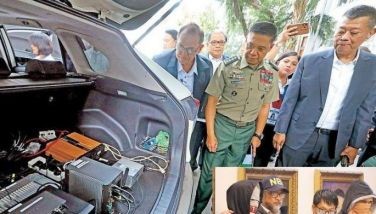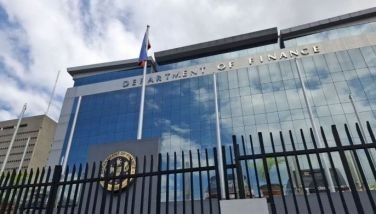Music makes the people come together at Pop Emergency
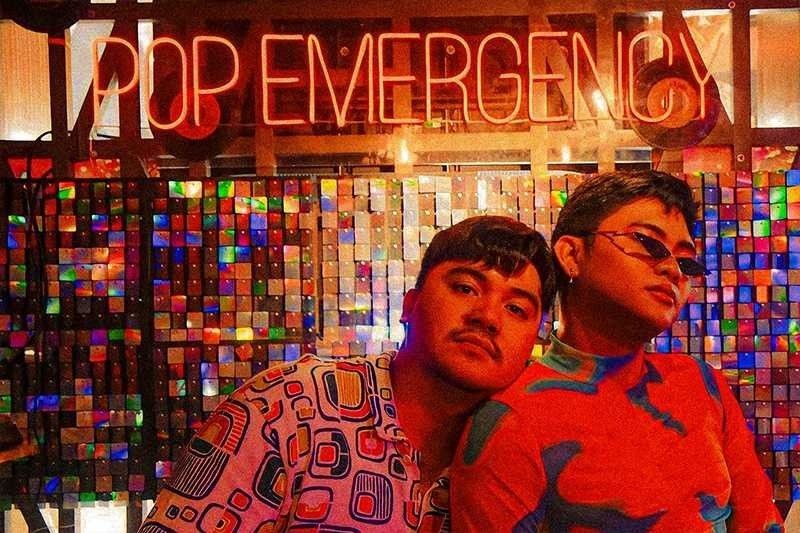
MANILA, Philippines — This is a story about disappearing. But also about being seen.
First, to disappear. Our location is Mother Ignacia in Quezon City, where many things have disappeared in the past three years alone. What was once a bustling street thanks to the presence of ABS-CBN’s employees has gone quiet since the media giant was taken off free TV. The noise has passed like the rainshower that gave the avenue a glossy sheen one Saturday afternoon that I paid a visit.
The sun hit the signboard of a Japanese restaurant on the second floor of a building right next to one of the Ministops that never had the chance to rebrand as Uncle John’s as it closed after the shutdown. I went upstairs and saw an unfamiliar sight: Chairs and tables neatly arranged for dining customers. But do not be misled by its appearance in the day, because on certain Saturday nights, usually at this place, they move the furniture so we can dance and disappear.
You are invited to come as you are. No need to dress fancy. The hosts of these nights say this is an “equalizing space,” after all. Grab a drink. Maybe two — or none. Then when the music starts playing, ease yourself onto the dancefloor lit red by the bright neon sign stuck on the wall behind the DJ booth. Start moving your body to the beat of the music and notice that others are doing it too. Soon, you become a choir singing — maybe even screaming — from your throats inescapably catchy pop anthems. Then, you are no longer there, but have become one with a mass of bodies chained to the rhythm.
This is Pop Emergency: A gathering of all the lovers of pop music frequented mostly by queer people.
Maybe the internet raised us
We have the internet to thank for Pop Emergency’s genesis. This is where project manager and entrepreneur Alwyn Mancio and art director and university lecturer Adrian de Guzman met and bonded for “hours and hours” over their mutual love for pop music and pop culture.
“I feel like that is the core of our relationship, our foundation,” Mancio said partly in Filipino. De Guzman said they clicked as they were both “raised by queens”: Beyoncé and Britney Spears, respectively.
In 2019, the two pop superfans were catching up with each other and recapping the Grammys and the MTV Video Music Awards at a café near work during their lunch break when De Guzman brought up a podcast that tackled pop music and pop culture.
“How about we do it?” Mancio recalled De Guzman saying.
“Okay, sure,” Mancio replied.
In an hour, they said, they filled pages with ideas and outlines for 20 episodes for what would become the Pop Emergency podcast.
“I don’t know, maybe it’s the caffeine talking at that time,” Mancio said. “It was like, pages of what we can talk about, the plans that we can have after this, the vision of what we wanted to do.”
But the idea remained just that. They said they were too busy with their day jobs to work on a podcast, which they believed they had to go to a recording studio for.
Then, the pandemic hit. Everyone had to stay home and most things shifted online. Mancio and De Guzman found themselves where they started. They revisited their idea to launch a podcast on pop music and pop culture and used the time stuck in their houses to nourish a creative boom to keep themselves occupied.
Armed with a laptop and a Zoom account, Mancio and De Guzman started recording episodes for the Pop Emergency podcast, which launched during what was one of the loneliest times for many Filipinos.
“The pandemic — really hard times,” De Guzman said. “I think what was the most touching for me is that we became their company during those sad times.”
With support from friends, Pop Emergency kicked off with 20 listeners that grew to a hundred, then thousands, to tens of thousands. Filipinos from across the globe tuned in. The podcast climbed the charts all the way to Top 3 of the music commentary category.
Record labels tapped them as partners, invited them to listening parties and asked them to interview their artists. Messages came in from their listeners, expressing how grateful they were for the podcast as Mancio and De Guzman were sharing their pop culture knowledge.
Ready, rain on me
Production of the podcast had to stop when Typhoon Ulysses hit the Philippines and inundated vast swathes of Luzon, leaving over 100 dead and at least P20 billion in losses.
“We just really couldn't release episodes (as if nothing had happend),” De Guzman said.
Pop Emergency was just getting its footing. The two wanted to help victims of the typhoon and were frustrated that bigger personalities were not boosting calls for aid.
So Mancio and De Guzman did it themselves.
“I think it came from our frustration that some people who have a huge following do not really use their platforms to send the message that people need help,” Mancio said. “We just had, what, 1,000 Twitter followers? A hundred followers from Instagram? But at least people were listening. People were engaged with us.”
“So we said, maybe we can use Pop Emergency for us to call for help and at the same time do something that is purposeful and communal because people are going to contribute to it.”
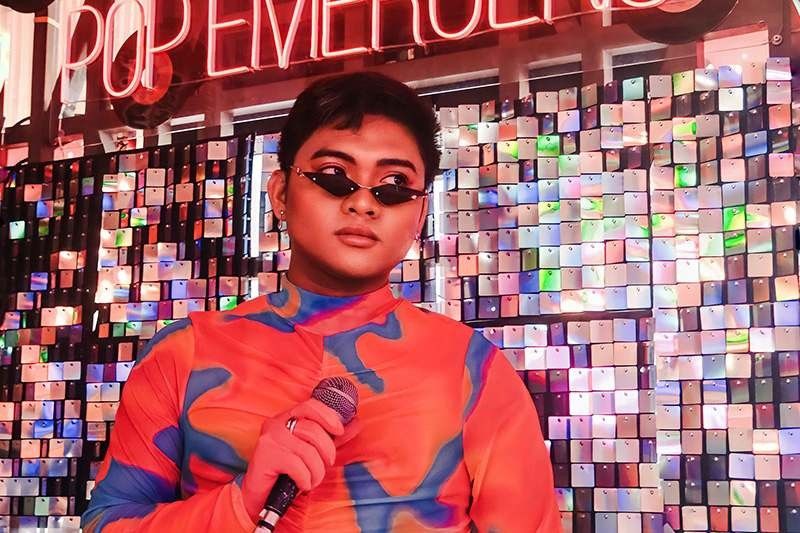
The music nights, named after Dua Lipa’s 2020 album, came into being. With coronavirus restrictions still in place, Pop Emergency’s first Future Nostalgia was done over Zoom.
Mancio and De Guzman had expected it to be awkward — like many virtual events were — but they said it was a blast. As DJs Jer Dee and Marky spun pop bangers, people turned on their cameras, brought drinks and danced on their own together.
Perhaps, most importantly for a fundraiser for typhoon victims, people opened their purses. At the end of the night, they had collected P70,000.
“For us, it was a very huge thing and we’re so thankful because at that point, from a podcast, it became a platform,” De Guzman said. “Platforms can do a lot of things. If we are needed for certain causes, we’re gonna be there. And if we’re gonna be a platform to promote an artist or collaborate with an artist, we can be that also.”
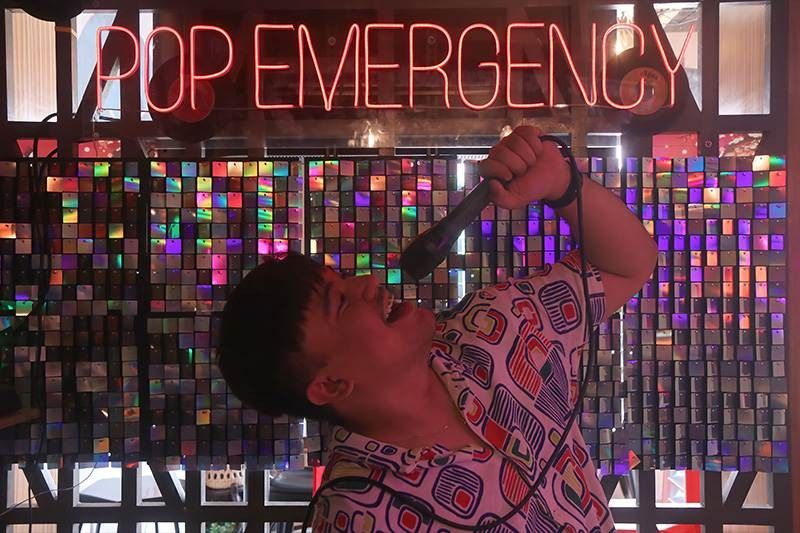
Pop Emergency and the community it built turned up again for its first Pride and Power event, which was to support the Golden Gays — an organization of elderly queer Filipinos — during which they raised roughly P27,000 for the lolas. When then Vice President Leni Robredo ran for president, the Pop Emergency community stood with her and raised P200,000 for her campaign.
When love takes over
When COVID-19 restrictions eased, Mancio and De Guzman seized the opportunity to take Pop Emergency’s music nights offline and into the real world where people can finally dance the night away with other people to the pop songs of the pandemic. They were only expecting 80 people to attend their first in-person Future Nostalgia at Pop Up in Katipunan, but around 500 turned up, excluding those who partied from behind the fences.
Night after night, Pop Emergency’s patrons — Kapitbahays, as Mancio and De Guzman would call them — would flock to wherever the party was and just dance. At the core of it all, they said, is music that makes the people come together.
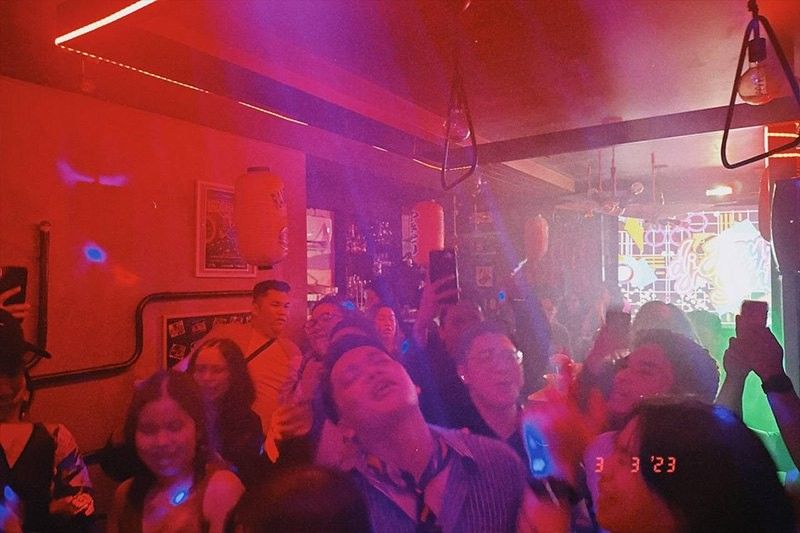
“It’s really music. I think, we don’t put ourselves in the front. We put music to the front, to the point that this is our common denominator. So why don’t we harp on it and celebrate music as is?” De Guzman said.
Mancio added, “It’s always music and beyond us. It’s not us. Maybe it’s us facilitating it. You can call us facilitators or hosts of these things.”

But it is not lost on them that they have also become community leaders with the power to mobilize people towards social change, especially for the queer sector.
“We gather people and ask them to come here and celebrate music. And it could transform into other things as well, to the social changes we could push as community leaders, as queer people who believe that there is a gay agenda and for us to be seen everywhere,” Mancio said.
This is their goal for their next Pride and Power event on June 17 in Quezon City: To create a bigger stage for more people to see and hear queer talent.
???? Mga Kapitbahay! ????
— Pop Emergency ???? (@popemergencyph) May 25, 2023
LOVE, LOVE, LOVE for EVERYBODY!
POP EMERGENCY and @UMUSICPH bring you the brightest and biggest music night #PrideAndPower Vol.3 Love Takes Space ???????????????? AN ALL-QUEER VARIETY AND MUSIC NIGHT to celebrate YOU!
CLICK HERE TO REGISTER: https://t.co/TjNAwxYaP2 pic.twitter.com/0Xw5KBIlgP
“The root cause of having that kind of progress for social change is to be seen, to be heard,” De Guzman said. “It’s important for us because that’s when you know when people are being moved and they are also invited to take part in that social change of being seen and making people be seen as well.”
“We are people. We shouldn’t be treated as others. We should be treated equally as individuals,” Mancio said when asked why it is important for queer people to take space. “Regardless if we are talents, regardless if we are artists, queer people are people.”
- Latest
- Trending















